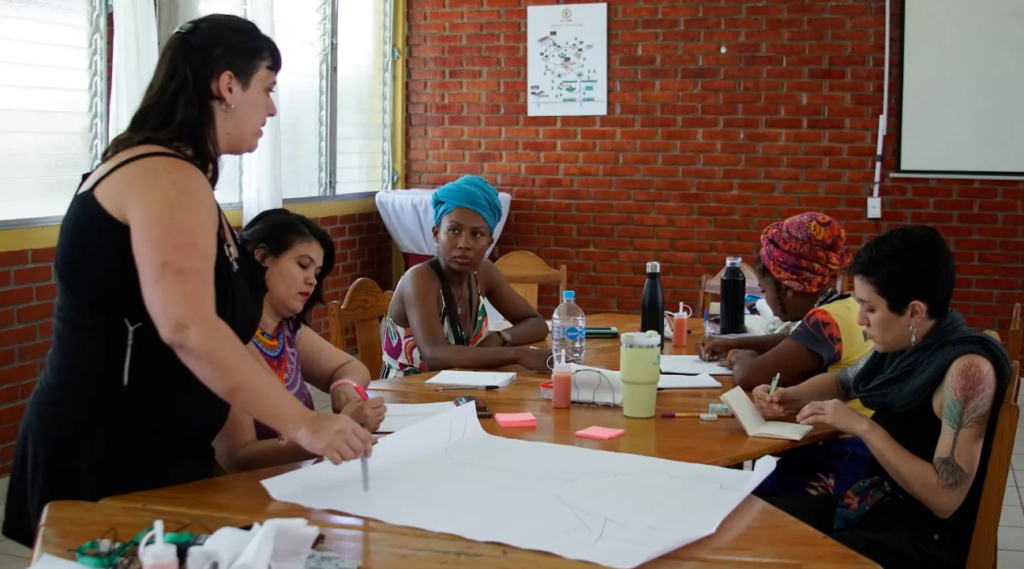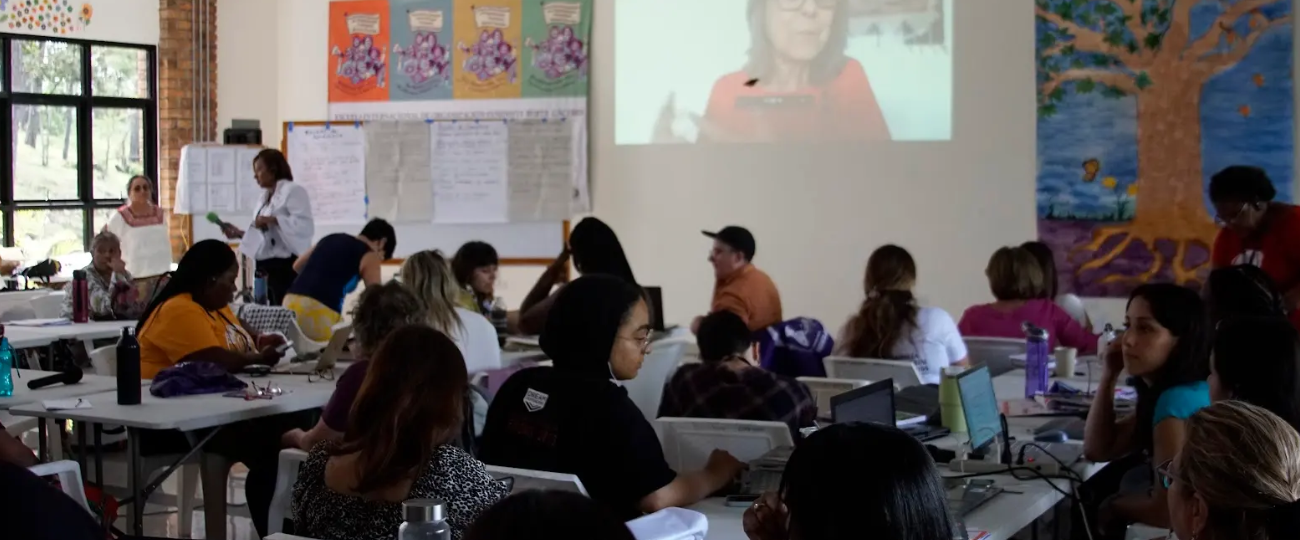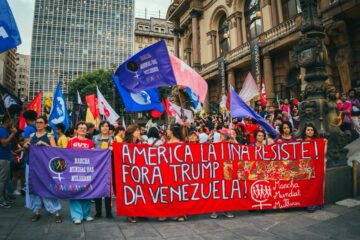The first onsite edition of the Berta Cáceres International Feminist Organizing School (IFOS) for Facilitators was attended by 75 militants from 26 countries and it took place at Centro Ecosol, in Honduras, August 5-9, 2024. The School for Facilitators aims to expand and further feminist perspectives and methodologies to advance political education capacities and encourage the organization of regional and local schools.
The School was also an important moment to strengthen alliances between grassroots movements and organizations that build this political educational process. Representatives of continental movements and platforms attended the School, including Alba Movements, Friends of the Earth Latin America and Caribbean (ATALC), the Trade Union Confederation of the Americas (TUCA-CSA), and the World March of Women from several countries, as well as feminists who are members of national or local organizations linked with environmentalism, trade union movements, feminist economy, food sovereignty, Black and migrant movements, and others.
In this collective, Berta Cáceres—whom the School is named after—and Nalu Faria, one of the School’s founders, were remembered from the beginning. The first mística included Maya spiritual practices for greeting the ancestors, the cardinal points, and the four elements of nature. Also during the opening session, the IFOS coordinator, Sandra Morán, looked back on Nalu’s teachings as she said that, if we do not feel butterflies in our stomach in the beginning of something new, then we should be concerned. “We must learn and also unlearn. We feel butterflies in our stomach because we know that we are not completely ready, that we will learn through the process,” Sandra said.
Education Through Process and Movement
The process of creating the IFOS started in 2018. Since then, one of its main focuses is on the reflection about building a feminist political subject that can interpret reality, propose an alternative political project, and have women self-organize for this change.
This reflection comes from understanding the systems of oppression and building feminist economy as key tools in this political project. “Feminist economy is diverse and takes on new proposals depending on the territory, but it is important to ascertain how these proposals come together,” Sandra argued. She then addressed an important connection between different struggles waged by women around the world, which have their meeting point in the rebelliousness against capitalist, racist, and patriarchal exploitation. She said that Cuba and Venezuela are examples of people who exercise these political proposals and that we must find inspiration every day.
Participants at the School for Facilitators strove to hold in-depth discussions about perspectives on popular education through the lens of decolonial grassroots feminism. This is a collective, broad, situated movement demanding women’s autonomy over their bodies and sexualities, care for nature, and the power of a political proposal that can reorganize society. The methodologies adopted and the way different topics were discussed build feminist knowledge coming from different territories and experiences of struggle.
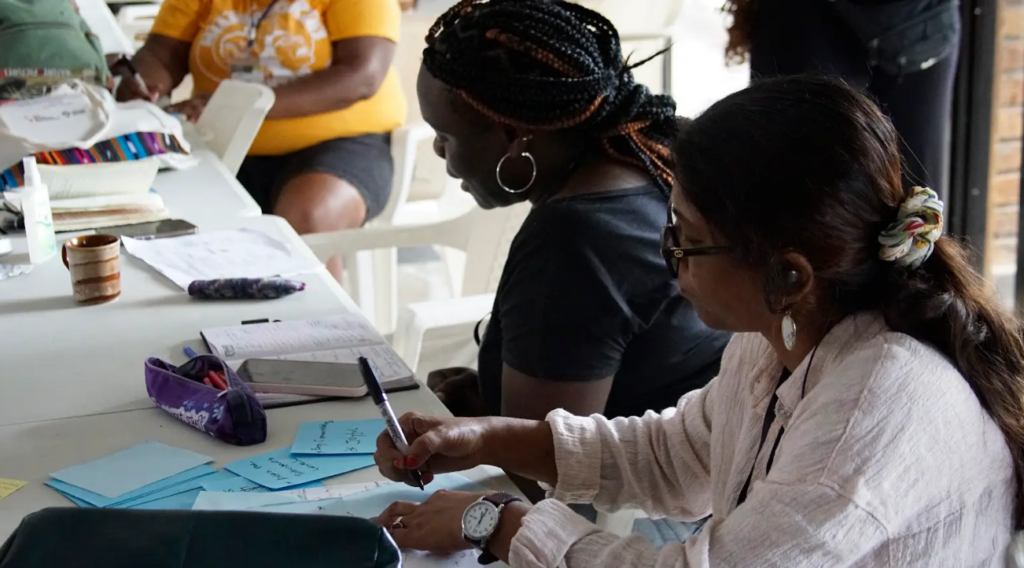
Political Subject: Feminist, Diverse, From the Grassroots
Carmen Díaz, a member of the School’s methodological commission, argues that the School is our university: “We are epistemic beings —that is, we are producing knowledge. We don’t need a degree. We only need to recognize our ability to conceive thought. We also cannot separate thinking, feeling, and theorizing. This allows us to apprehend what it means to build a liberating, feminist, grassroots political subject.” This political subject is built within grassroots feminism, a movement that connects local and global realities. “We have the epistemic skill and creativity. Even though epistemic skill is only recognized in universities, we are also building knowledge,” Sandra adds.
The feminist political subject is empowered when a collective, continuous building process is made visible. It is a subject shaped and changed by everyday life in its diversity, which can come together in the struggle against the capitalist, patriarchal, and racist system. The discussions at the School brought to light the need for joint coordination and empowerment between grassroots movements with international perspectives—a foundational strategy of the World March of Women. In countries marked by intense authoritarianism, women fighters often feel alone and isolated. Internationalist spaces such as the IFOS create possibilities for them to speak and listen, and for building alliances that empower and protect women on the ground. The School is not only a meeting or an isolated event, but a process that contributes to empowering the internationalist feminist movement.
Methodological Guides
In an interview to Real World Radio, María de los Ángeles, of the Movement of People Affected by Dams in Latin America (MAR), addressed the feminist methodology implemented at the IFOS. “This political-pedagogical conception of grassroots education based on its methodology rests on a set of principles that saves the collective building of knowledge, the dialogue of knowledge based on diversity. It seeks to decolonize subjectivities and those Eurocentric, patriarchal, colonial patterns of education that are embedded in our actions. We say that the methodology crosscuts the generation of significant emotional learnings that are part of our way of thinking, feeling, and acting”, she argues.
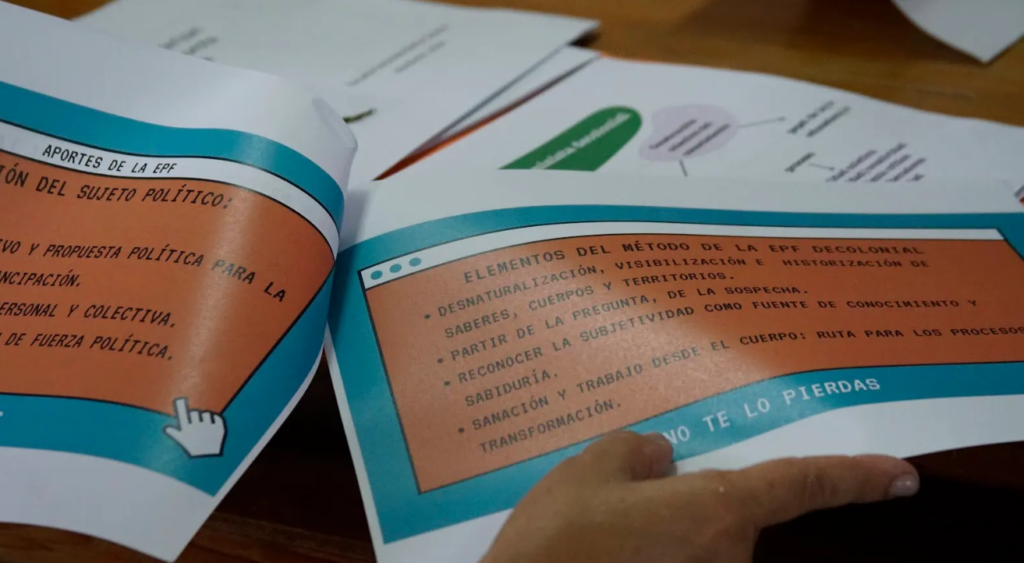
The methodologies and tools developed during the online editions of the IFOS were systematized in a popular education perspective. Today they are part of the “toolbox” adopted when holding new editions of the School. They are not a fixed instruction manual, but rather guidelines and instruments to help facilitate feminist popular education, the goal of which is movement building.
“This methodological planning process is learned through practice. It is hard to have all the theory in your head. This is why, as we work, we will add more questions, more doubts, and then, all of a sudden, some of that will provide resolutions,” Verónica del Cid, of the Mesoamerican Popular Education Network (Rede Alforja), says. These methodologies and tools support the building of the anti-capitalist, feminist, grassroots project to change the world and people’s lives based on a political proposal that includes care and affection networks that support us and keep us in the struggle.
Discussions about the necessary tasks to conduct feminist education included the work of reaching a synthesis, which can happen in different formats and languages. It can also be a shared work, which shows how important the memory of the feminist organizational processes is.
The tools that are shared, developed, or discussed in depth in the School support the understanding and formulation of thematic pillars through identifying and tackling the systems of oppression. These pillars are connected to reclaiming the major role played in the history of women’s and peoples’ struggles as well as the context of grassroots struggles and feminist rebelliousness. Through an emancipatory political project, they aim to strengthen the building of the grassroots feminist political subject.
A forum was organized at the School with online and onsite participation, where representatives from several countries and continents shared their views about the advances of the far right in local election processes. Our African sisters played the main role in this forum and reported situations of violence and conflict in the region. The participants then established links between their territories and discussed the role of wars, armed conflicts, and other forms of advances promoted by capital against women’s bodies and territories.
The toolbox discussed during this edition of the School for Facilitators includes methodologies that express the pedagogical path of the IFOS. Part of the methodology includes dialogue and the acknowledgment of differences and tensions in shared political building. As Verónica says, one characteristic of this process is the dialogue with the diversity of grassroots movements toward overcoming contradictions to empower organizational, mobilization, and struggle capacities: “the contradiction is methodologically provoked, because we acknowledge we do not think alike and we appreciate that, because that is a driver for new knowledge.”
